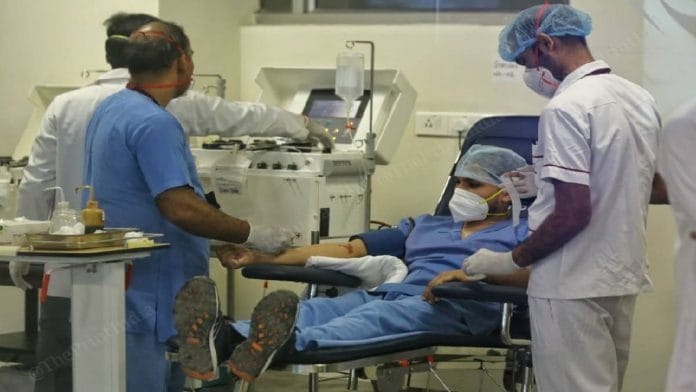New Delhi: The Randomised Evaluation of COVID-19 Therapy [RECOVERY]) trial has found that the use of plasma therapy on hospitalised Covid patients does not improve survival rate or any other pre-specified clinical outcomes.
The study published in the medical journal The Lancet Friday is assessing several possible treatments in patients hospitalised with Covid in the UK. The trial is underway at 177 NHS hospitals from across the UK.
“In RECOVERY, the largest clinical trial of convalescent plasma for any infectious indication, we did not find evidence that high-titre convalescent plasma improved survival or other prespecified clinical outcomes in patients hospitalised with COVID-19. Whether convalescent plasma would benefit other patient groups is unknown and would need to be evaluated in other, adequately powered, randomised clinical trials,” the study said.
Earlier, other studies including India’s ICMR-PLACID Trial, as well as Argentina’s PlasmAr Trial have also shown that plasma therapy has no benefit on hospitalised Covid patients.
However, the health ministry’s AIIMS-ICMR National Covid Task Force guidelines issued on 22 April allow the ‘off label’ use of plasma therapy at the stage of early moderate disease, i.e, within seven days of the onset of symptoms, and if there is availability of a high titre donor plasma.
A group of 18 clinicians and public health professionals last week wrote to the central government asking it to change guidelines in this regard.
How the study was conducted
Between 28 May 2020 and 15 January 2021, 13,127 (81%) of 16 287 patients enrolled into the RECOVERY trial were eligible to receive convalescent plasma. Of this, 1,569 (12%) were randomly assigned to the REGN-COV-2 group and are not included in the study. Of the remaining 11,558 patients, 5,795 were randomly assigned to the convalescent plasma group and 5,763 to the usual care group.
Outcomes were assessed at 28 days after randomisation, with additional analyses specified at 6 months.
Also read: Doctors hint at cow dung-black fungus link as people turn to gobar for Covid ‘cure’
What the study found
The study found no significant difference in 28-day mortality between the two groups: 1,399 (24%) of 5,795 patients died in the convalescent plasma group and 1,408 (24%) of 5,763 patients died in the usual care group. The median time to discharge was 12 days in the convalescent plasma group and 11 days in the usual care group.
“Patients in the convalescent plasma group had a similar probability of being discharge alive within 28 days compared with the usual care group (3832 [66%] of 5795 patients in the convalescent plasma group vs 3822 [66%] of 5763 patients in the usual care group,” the study said.
Even in terms of progressing to secondary outcomes, which include requiring intrusive medical ventilation, the study found no difference in the two groups. “The number of patients progressing to the prespecified composite secondary outcome of invasive mechanical ventilation or death was similar in the two groups (1568 [29%] of 5493 patients in the convalescent plasma group vs 1568 [29%] of 5448 patients in the usual care group,” the study said.
“The results of this large, randomised trial show that convalescent plasma did not improve survival or other clinical outcomes in patients hospitalised with COVID-19,” the study said.
“The results are consistent with the evidence from previously reported randomised trials of convalescent plasma for patients hospitalised with COVID-19,” it added.
The study cautioned against the use of plasma therapy due to the insufficient evidence on its efficacy.
“During an epidemic caused by a novel virus, convalescent plasma is an appealing treatment because it might be available within weeks of the outbreak, long before other targeted therapies are available. Consequently, convalescent plasma has been widely used for COVID-19 outside of clinical trials but, until now, there has been insufficient evidence from randomised trials to reliably assess its safety and efficacy,” the study said.
However, the researchers said that while the study was conducted only on hospitalised patients, it is not known whether the use of plasma will benefit other patient groups.
Also read: Growing plasma, remdesivir use will help Covid virus mutate, become stronger: Ex-ICMR scientist






